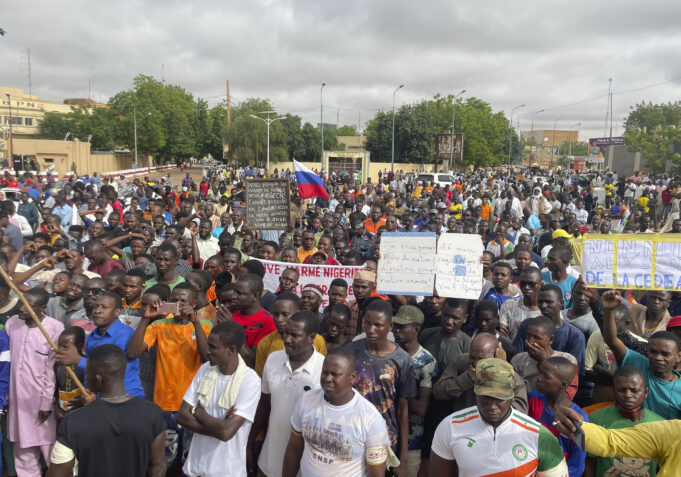The United States is losing sway in Africa as several West African nations are clearing the deck of being yoked to powers like America and France. The U.S. was shown the door by Niger in March, severing a longtime military alliance.
According to the U.S. Department of Defense and the Nigerien Ministry of National Defense, keeping with a negotiated withdrawal agreement, U.S. forces must be out of Niger by September 15. The Department of Defense (DOD) announced the measures on a May 19 media call.
The Defense Department said the relationship between the countries’ militaries “remains strong” after a “lengthy history” of over a decade. However, they are “working against the backdrop of much more challenging political situation.”
Both militaries worked together to counter threats from violent extremist groups permeating the Sahel and West Africa. However, the move is part of a wave of African nations removing Western forces from their lands.
“The Government of Niger, taking into account the aspirations and interests of its people, denounces with immediate effect the agreement relating to the status of military personnel of the United States and civil employees of the U.S. Department of Defense on the territory of Niger,” said Col.
Amadou Abdramane, spokesperson for the ruling National Council for the Safeguard of the Homeland (CNSP), in an earlier televised statement on March 18.
The fallout stemmed from U.S. officials accusing Niger of entering a secret deal to provide uranium to the Islamic Republic of Iran, which the military junta refutes, according to The Wall Street Journal.

Niger is the seventh largest uranium producer worldwide, according to the World Nuclear Association. Days before announcing the expulsion, the matter was raised at a high-level meeting between Nigerien and U.S. officials.
“The government of Niger rejects the false allegations of the head of the American delegation, that it has signed a secret agreement on uranium with the Islamic Republic of Iran,” clapped back Mr. Abdramane, in his statement.
Military leaders overthrew Niger’s Western preferred president, Mohamed Bazoum, in July 2023 and formed the CNSP ruling council. In the way of telling Washington to “mind your mouth,”
He argued that Niger has the right to select its own diplomatic and military partners and that Niger-Iran relations are long-standing. Then addressing another U.S. concern, he said Niger’s “state-to-state” relations with Russia are transparent.
Regional allies of Niger and fellow military governments, Mali and Burkina Faso, have also deepened ties with Moscow and cut them with France, their former colonial ruler. The three African countries formed the Alliance of Sahel States to show their willingness to stand up to imperialist countries.
The fallout could be seen as a strategic blow to Washington because Niger was an operational hub for U.S. forces. The U.S. has nearly 1,000 military personnel and two drone bases in the country as part of its Africa footprint.
The exit began in early June from Air Base 101 in Niger’s capital, Niamey, and America’s prized $110 million Air Base 201 in Agadez, its largest on the continent, and base for intelligence gathering in the Sahel region. The withdrawal follows the French army’s departure at the end of 2023, and the April entry of Russian military instructors.
“I think progress is being made in the areas of recognizing that the U.S. Africa Command (AFRICOM) and the French Overseas Forces are not the solution to instability, and cohesiveness,” said Abayomi Azikiwe, political analyst and editor of Pan Africa Newswire. “African states themselves have to come closer together in order to defeat these rebel groups,” he added.
African nations detaching themselves from France and America and quitting the regional Economic Community of West African States (ECOWAS), which they saw as a collaborating actor with the West, was bold.
Some see the moves as a legitimate backlash against foreign domination and meddling, prompted by a failure to defeat violent extremists, which was the pretext for American and French boots on the ground.
“These countries have realized that the presence of U.S. military forces, along with French military forces, has done more damage than has helped,” said Mr. Azikiwe.
“The reason why is because many of these so-called jihadists, or Islamic rebel groups, have their origins in U.S. intelligence,” he added.
Mr. Azikiwe was referring to the U.S. role in the establishment of Al-Qaeda as an outgrowth of U.S. efforts to overthrow the Soviet-backed government in Afghanistan in the latter part of the last century.
It was the same for ISIS, which grew out of Washington’s effort to prevent Shia-oriented Islamic resistance groups in West Asia from consolidating in what is called the “Axis of Resistance,” which forcefully came into being since the destruction of ISIS in Iraq and Syria, he explained.
Some leaders of the African military governments had trained with the U.S. Africa Command (AFRICOM). “They realized that what the United States says is quite different than what it actually does,” opined Mr. Azikiwe. “So, this realization has brought about an awakening,” he added.

They are realigning themselves with Russia and China for security and economic partnership which has made a mockery of the Biden administration’s “supposed interests” in African development.
“He’s never gone there. During the whole term of his presidency, he hasn’t set foot on the African continent,” said Mr. Azikiwe, and “Right now, he probably is reluctant to go … because he may be met with mass protests.”
He says the expulsion is a positive development. But America nor France is giving up. They are still engaging in destabilization efforts on the continent. America is courting coastal nations like Ghana and Benin as willing “partners” for AFRICOM.
Over the last 70 years, African nations have been through much, from colonialism to independence struggles and victories, then neo-colonialism, and a renewed scramble for the continent’s mineral wealth and now foreign-induced militarism.
Africa remains central as a financial source for global powers seeking to remain viable into the 21st Century. Now, a quarter of the way in, inordinate foreign control and influence still plague the continent of 1.4 billion people. For some Africa watchers, after decades of “independence,” African nations need continental unity, and a full and complete freedom.
“On the one hand, there is a greater recognition of the need for unity and sovereignty,” said Mr. Azikiwe, “but at the same time, unless we are united, we won’t be able to effectively combat the destabilization efforts that are underway on a daily basis,” he adds.
The pushback by African nations comes at a time of the overall decline of America and White world rule and amid a time of a universal cry for justice and dissatisfaction with the status quo. The Honorable Minister Louis Farrakhan, the National Representative of the Most Honorable Elijah Muhammad and the Nation of Islam, along with his teacher warned justice will come from the God of Justice.
Both men cautioned that the powerful are at the crossroads of reaping what they have sown. They sow war, bloodshed, and looting of natural resources and mineral wealth of marginalized nations. They will reap the bitter cup of their own demise and diminution of fruits.
“Seven billion people on our planet are upset, angry, dissatisfied with those who lead and govern their lives and the institutions that have been put into place by various governments to govern lives of the people of the Earth,” said Minister Farrakhan, in a Feb. 22, 2015, address called, “The Intensifying Universal Cry for Justice.”
This intense cry for justice demands The Presence of God—and we find Him in The Great Mahdi, he said. The Mahdi is the “Self-Guided One” prophesied to set justice in the earth, eradicate tyranny and establish a universal government of peace.
Every nation on earth now, if you listen to the politics of each country, is running on a theme about “change” to satisfy their dissatisfied elements, the Minister explained.
“But no change can satisfy the demand of the human family for justice. No change orchestrated by those presently in power could ever satisfy the cry of the people,” said Minister Farrakhan. He explained because this cry is not from a petty hurt or pain; it’s not a cry to “fix the unions,” or “straighten out the politics,” or “get the mosque right or the church right”—it’s so much deeper than that.
“The change that will satisfy the cry of humanity can only come from God Himself,” said Minister Farrakhan.













